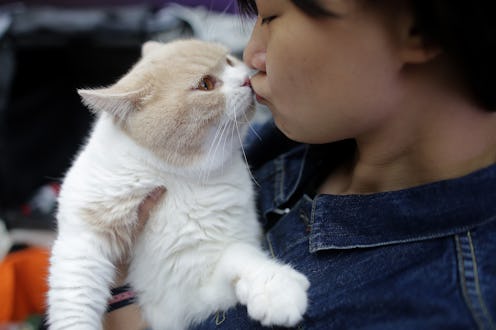Life
This Will Make Your Cat More Affectionate
If your feline companion has turned into a chubby little lumpkins, you've probably worried that cutting back on the treats wont go over too well. Many owners fret that their pet will hate them for limiting portions, but a recent study published in The Journal of Veterinary Behavior found that putting your cat on a diet actually makes it more affectionate.
Pet owners want their cat to be healthy and energetic, but fear that restricting food will incite depressed or hostile behavior. To test if restricting calories would alter cats' affections, researchers at the Cornell University College of Veterinary Medicine put 48 obese cats on one of three different weight loss diets. In order to compare behavior, owners had to fill out a questionnaire detailing their cat's pre and post-feeding behavior — such as does your cat bite? Scratch? Lick? Meow? Rub up against you?
Obesity in cats is described as being 25 percent or heavier than the ideal weight, and the numbers have been climbing in the US. A 2009 study found that 35 percent of US cats are obese and a 2014 survey found that approximately 57.9 percent of cats are overweight. And while a hefty kitty can be pretty darn cute, it is still a cause for concern. Cats who are carrying around extra pounds are less mobile and more likely to develop health issues such as diabetes, skin conditions, arthritis, heart disease, among others.
Happily, after eight weeks on the diet most of the cats in the study (76 percent) lost weight, with the high fiber diet leading to the most overall weight loss. The animals' appetitive behaviors increased, however cats did not start begging earlier during the period of dieting. So, yes, if you cut back on calories, you will still feel guilty from the increase in following, begging, meowing, and pacing before a meal, but thankfully it will only last a short time.
Once sated, researchers also found a marked increase in the cat's affectionate behaviors — such as jumping into the owner's lap and purring. Researchers concluded that "Of the cats that changed behaviors, the appetitive behaviors typically increased, and the owners felt that their cats displayed more affection." So, you have to watch your baby whine and beg, but then you get to enjoy the love! Dr. Bonnie Beaver, the executive director of the American College of Veterinary Behaviorists, confirmed that owners shouldn't fear retribution from putting their furry friends on a diet. She told The New York Times, “We don’t know why, but cats don’t hold a grudge if you limit their food.”
But how do you stop your cat from packing on unnecessary pounds in the first place? Many owners choose to "free-feed" their cats, leaving out dry food for them to eat as they please. Bored house cats are prone to over-eating (just as I like to free-feed on a bag of potato chips on a lazy Sunday). If a cat has trouble with portion control, the owner can institute regular feeding times and possibly train the cat to go to their regimented feeding place and wait "patiently" for their supper.
Misreading a cat's cues and reinforce negative behavior (feeding it to stop it from swatting or begging) or encouraging affectionate behavior with treats is also a problem. Many owners show their love and try to curry favor with their pets through the administration of treats. While we hold the food, it seems our cats have all the control. Dr. Richard E. Goldstein, chief medical officer at New York's Animal Medical Center, told The New York Times, “A cat learns to manipulate us very well: when she’s hungry, she’s the most affectionate cat in the world. And people will do anything to keep their cats happy.” To show your pet some love, put the snacks away and engage its other senses with a little playtime. That's something you both can enjoy!
